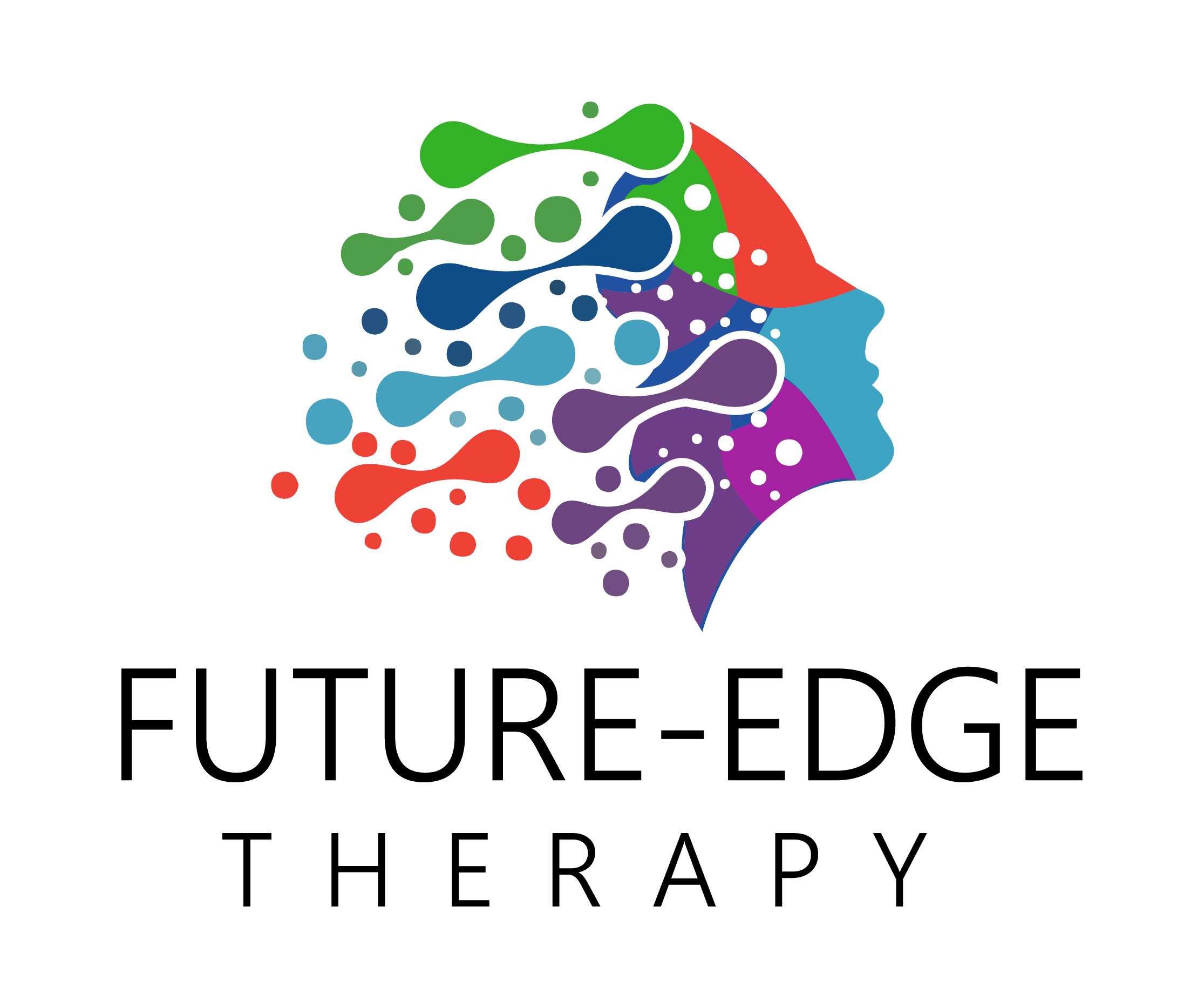
12 Nov Nervous System Healing: Why Regulation Holds the Key to Emotional Balance
Have you ever noticed that your emotions can feel completely out of your hands sometimes? Maybe you feel fine at one moment but then all of a sudden you feel anxious or tense and you don’t know why? Don’t worry we know it can seem scary not knowing why this is happening but it is just your body simply trying to keep you safe. This is where nervous system healing comes in, helping you understand and calm those sudden emotional shifts.
The truth is, a lot of what we call emotional struggles actually begins in the nervous system. It’s the network running through every inch of your body, quietly managing how you respond to stress, danger, and even connection. When it’s working well, you feel steady, grounded and capable. When it’s not, everything can feel a bit chaotic as your thoughts start racing, your heart pounds, and your emotions swing about more than you’d like.
At Future Edge Therapy, we see this all the time. People come in wanting to “fix” their anxiety, overthinking, or emotional overwhelm and often what’s really needed is nervous system regulation. Because emotional balance doesn’t come from ignoring your feelings or forcing positivity. It comes from helping your body feel safe again.
A Simple Look at the Nervous System
Let’s strip away the science jargon for a moment. The nervous system basically has two main settings:
- Fight or flight (sympathetic system) – the one that kicks in when there’s stress or perceived danger.
- Rest and digest (parasympathetic system) – the one that allows you to recover, heal, and feel calm.
Ideally your body will move between these two states smoothly. When you get stressed you will deal with it and then return to being calm. But for so many of us, it’s not that simple as modern life doesn’t allow it. Constant messages, work pressure or even unresolved trauma can keep the system stuck in alert mode and then over time this eventually becomes your “normal”
How Dysregulation Sneaks In
You don’t need a diagnosis to have a dysregulated nervous system, you might just notice that you are tired all the time, easily triggered or feel a sense of unease that you can’t put your finger on. Maybe you wake up already tense or your mind won’t stop spinning before bed.
It’s easy to miss these signs because they’ve become so common. But they’re often your body’s way of saying, I’ve had enough.
You might notice:
- Feeling on edge or wired, even when things are fine
- Sudden waves of sadness or irritability
- Struggling to concentrate or make decisions
- Physical symptoms like tension, jaw clenching, or gut issues
- Feeling emotionally detached or numb
When your nervous system’s out of sync, your emotions don’t flow — they either flood you or disappear altogether.
When your nervous system is out of sync, your emotions won’t flow, they will either flood your or disappear altogether.
Regulation: The Missing Link in Healing
So what exactly is “regulation”? It’s the process of helping your nervous system come back into balance, learning how to shift out of stress and into calm when needed.
At Future Edge Therapy, we often see clients who’ve done years of self-development or talking therapy but still feel stuck. That’s usually because they’ve done the cognitive work (understanding why they feel how they do) but their bodies are still stuck in survival mode. You can’t think your way out of a threat response as your body needs to feel safe again first.
When regulation starts to happen, something shifts. Your emotions don’t feel so overwhelming anymore. You still get triggered but it passes quicker. This then means you start to trust yourself again.
Why Talking Isn’t Always Enough
Talking therapy is powerful, and for many people it can be life-changing. But sometimes, the body holds onto stress in ways words can’t reach. You might understand your patterns perfectly well, yet still find yourself reacting the same way.
That’s because the nervous system stores experiences as sensations. A racing heart, a tight chest, that urge to withdraw; these are all physiological responses. Without tending to them, the emotional charge stays alive inside you.
This is why approaches that include the body such as breathwork, grounding, gentle movement and somatic awareness make such a difference. Over time they start to give your nervous system new experiences of safety and with enough repetition it begins to believe it.
Small Ways to Support Regulation Every Day
While professional guidance helps a lot, there are small things you can start doing today to support your nervous system:
- Notice Your State: Pause a few times each day and check in: What’s my body doing right now? Is your jaw tight? Shoulders up near your ears? Are you breathing? Awareness alone is a huge first step.
- Ground in the Body: When you have times of feeling scattered, come back to physical sensations. For example feeling your feet pressing into the floor, touching something that is textured or taking a few slow breaths. These small actions can bring you back to the present moment.
- Breathe Intentionally: By completing long, slow exhales this will activate your parasympathetic system (your calming state). Try breathing in for four counts and out for six. However it is important to remember that you want to do this slowly and controlled without forcing it.
- Create Small Predictable Routines: The nervous system loves predictability. Having small daily anchors within your daily routine such as a cup of tea at the same time, a walk after lunch or journaling before bed. This sends the message that you are safe and you know what’s coming next.
- Seek Safe Connection: Co-regulation (feeling calm in the presence of another safe person) is one of the most powerful regulators there is. Whether that’s a friend, partner, or therapist, safe relationships help the body relax.
At Future Edge Therapy, we create that sense of safety through calm, attuned sessions that allow your system to settle. Because real healing can’t be forced; it has to unfold.
The Ripple Effect of a Regulated System
When your nervous system starts to heal, it affects everything. Your mind quiets down. You sleep better. You respond to stress rather than react. Even your relationships shift as you become more patient, less defensive, more open.
Clients often tell us they feel like they’ve “come home” to themselves. That sense of ease you might not have felt in years, it’s still there, just waiting for space to reappear.
And what’s beautiful is that your calm energy also supports others. When you’re regulated, the people around you naturally start to settle too. It’s how safety spreads.
Why Future Edge Therapy Focuses on Nervous System Healing
At Future Edge Therapy, nervous system healing isn’t a buzzword, it’s at the core of what we do. Our goal is to help clients understand how their system got dysregulated and how to gently guide them back into balance.
There is no ‘one size fits all’ method to restore individuals to a balanced state, our process is tailored to you, using a mixture of therapeutic conversation, mindfulness-based approaches and somatic tools to reconnect your mind and body.
The goal isn’t perfection. It’s about building a nervous system that is flexible, resilient and able to return to calm after stress. This is the foundation of real emotional balance.
In Closing
Healing your nervous system isn’t just a quick fix, instead it is a gentle re-learning process. It’s about building a relationship with your body again where it can finally exhale and trust that you are safe.
If you have been feeling anxious, disconnected or feeling stuck, it’s important to remember your system isn’t broken, it’s just doing what it learned to survive. With time, care and the right support, it can learn something new.
At Future Edge Therapy, we’re here to walk that journey with you, helping you find calm not just in your mind, but deep within your body too. Are you ready to take those next steps to regulate your nervous system? Contact us today for a free 20 minute initial consultation to assess your needs and identify if we are the right fit for you.
 7 ways to combat anxiety - Free ebook
7 ways to combat anxiety - Free ebook

